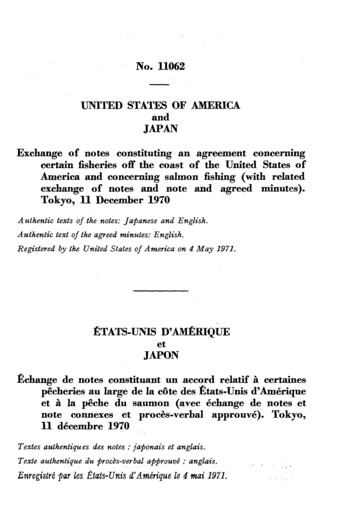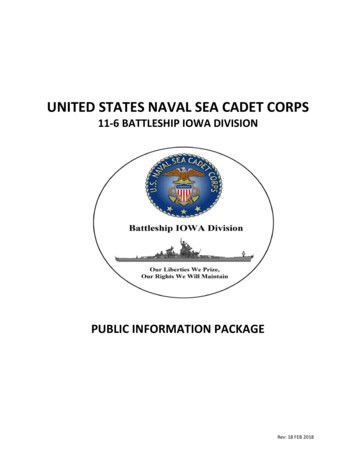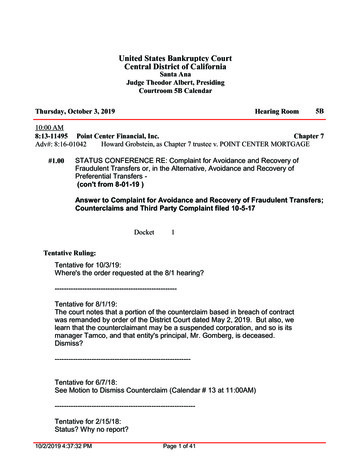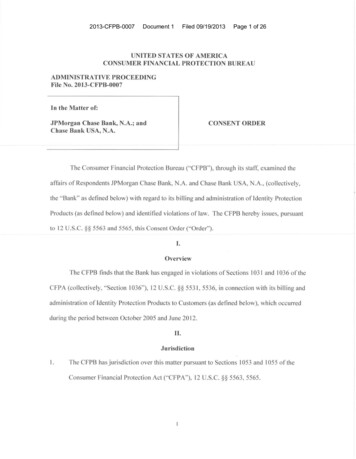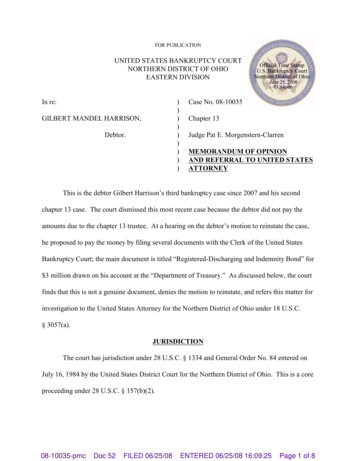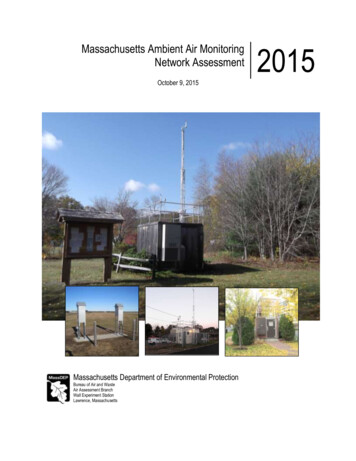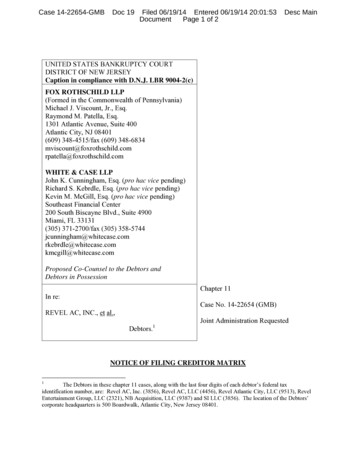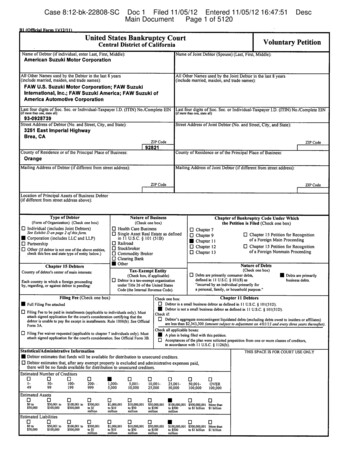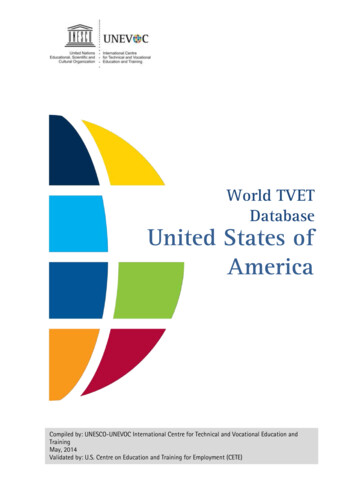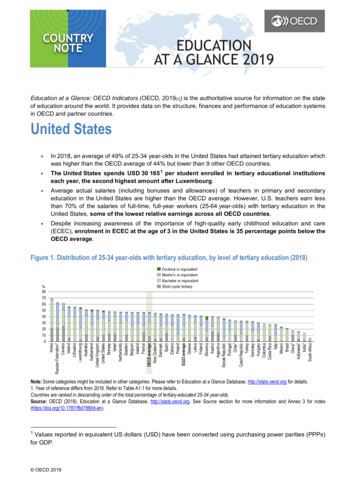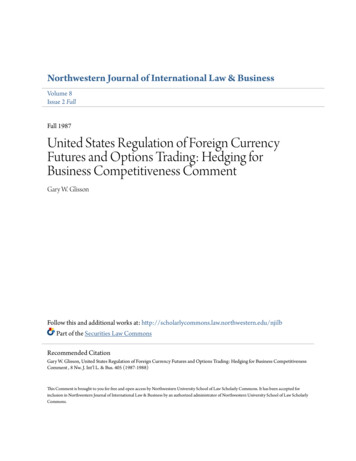
Transcription
Northwestern Journal of International Law & BusinessVolume 8Issue 2 FallFall 1987United States Regulation of Foreign CurrencyFutures and Options Trading: Hedging forBusiness Competitiveness CommentGary W. GlissonFollow this and additional works at: Part of the Securities Law CommonsRecommended CitationGary W. Glisson, United States Regulation of Foreign Currency Futures and Options Trading: Hedging for Business CompetitivenessComment , 8 Nw. J. Int'l L. & Bus. 405 (1987-1988)This Comment is brought to you for free and open access by Northwestern University School of Law Scholarly Commons. It has been accepted forinclusion in Northwestern Journal of International Law & Business by an authorized administrator of Northwestern University School of Law ScholarlyCommons.
COMMENTSUnited States Regulation of ForeignCurrency Futures and Options Trading:Hedging for Business CompetitivenessI.INTRODUCTIONAny firm exposed to the international economy has to realize that it is twobusinesses at the same time. It is both a maker of goods (or a supplier ofservices) and a "financial" business. It cannot disregard either.,Since the United States began to experience a merchandise tradedeficit, politicians, economists, and those in business have voiced concernover the need for United States business to be competitive, both at homeand abroad. Congress in particular has decried the lack of United Statesbusiness competitiveness and sought to remedy the problem, primarilythrough broad legislation aimed at forcing foreign economic competitorsto "level the playing field" or engage in "fair trade." Yet, in the rush toregulate foreign competition, Congress and government agencies haveoverlooked measures which can encourage self-help by domestic businesses. In addition to focusing on the regulation of foreign trade practices, Congress should examine domestic business regulation in its effortto promote competitiveness.United States businesses can improve competitiveness by minimizing the risks attached to operations in the international marketplace.Foreign currency fluctuation risk ("currency risk") is one such risk common to all businesses trading with or competing against foreign parties.Currency risk is the possibility of loss of value due to a decline in thevalue of a business's domestic currency against foreign currency.' Thisrisk has always been a fundamental one in international business transacI2Drucker, The Changed World Economy, 64 FOREIGN AFF. 768, 787 (1986).See infra notes 87-95 and accompanying text.
Northwestern Journal ofInternational Law & Business8:405(1987)tions, and may place a great burden on the profitability of a business,thus reducing its competitiveness.Businesses can control much of their currency risk through hedg3ing. An increasing number of businesses are realizing the benefits of654hedging against risk through the use of forward, futures, and optionscontracts. Congress and government agencies should encourage theseself-help risk reduction methods by creating a regulatory environmentwhich facilitates all means of hedging against foreign currency fluctuation risks.In the United States, the Commodity Futures Trading Commission("CFTC") regulates futures and options trading.7 The CommodityExchange Act' ("CEA") gives the CFTC exclusive jurisdiction over domestic futures trading9 and trading activities on futures contract mar3 Hedging can be broadly defined as an economic activity that reduces risk. For a more detaileddescription see infra notes 30-37, 90-92 and accompanying text; see also Rogers & Markham, TheApplication of West Germany Statutes to United States Commodity Futures Contracts: An Unnecessary Clash of Policies 19 L. & POL'Y INT'L Bus. 273, 277 (1987).4 Forward refers to the "forward market," which is an informal off-exchange market in contracts for commodities to be delivered at a future date. Glossary of Futures Trading Terms, in 1985CFTC ANN. REP. 138 [hereinafter CFTC Glossary]. It is a cash market for future delivery. For avery complete description of foreign currency forward contracts, see Gilberg, Regulation of NewFinancialInstruments Under the FederalSecurities and CommoditiesLaws, 39 VAND. L. REv. 1599,1653-59 (1986).5 A futures contract is an agreement to purchase or sell a commodity for delivery in the future:1) at a price that is determined at initiation of the contract; 2) which is normally traded on a board oftrade by members of the exchange; 3) which is used to assume or shift price risk; 4) which obligateseach party to the contract either to fulfill the terms of the contract or offset the contract by enteringinto an opposite transaction (by far, the more commonly chosen alternative). CFTC Glossary, supranote 4, at 139; see also Gilberg, supra note 4, at 1603-10.6 A commodity option contract is a unilateral contract which gives the purchaser the right tobuy or sell a specified quantity of a commodity at a specific price within a specified period of time,regardless of the market price of the commodity. CFTC Glossary, supranote 4, at 145. In an optioncontract neither party has an obligation to deliver unless the purchaser exercises the option. On theother hand, a futures contract imposes an obligation to deliver on the seller. Like a futures contract,exercising the option rarely results in delivery of the commodity. See also Gilberg, supra note 4, at1610-15.7 The CFTC was established in 1974 by the Commodity Futures Trading Commission Act("CFTCA of 1974"), Pub. L. No. 93-463, 88 Stat. 1389, amending Commodity Exchange Act of1936 ("CEA"), ch. 545, 49 Stat. 1491 (codified as amended at 7 U.S.C. §§ 1-26 (1982 and Supp. III1985)).8 7 U.S.C. §§ 1-26.9 The CFTC has jurisdiction over all futures and options contracts traded on contract markets,7 U.S.C. § 2a, except those placed under the jurisdiction of the Securities and Exchange Commission("SEC") by the Futures Trading Act of 1982 ("FTA of 1982"), Pub. L. No. 97-444, §§ 101, 102, 96Stat. 2294, 2294-96, amending 7 U.S.C. §§ 2, 2a (1982). The FTA of 1982 implemented the ShadJohnson Accords, which allocated jurisdiction over options on equity securities, any group or indexof securities, or any interest based on the value thereon, and currency options traded on nationalsecurities exchanges. See Joint ExplanatoryStatement of the SEC and the CFTC, [1980-1982 Trans-
Foreign Currency Futures and Options Trading8:405(1987)kets. t The CFTC also asserts jurisdiction over off-exchange" trading13activities,12 and trading activities by United States residents abroad.The regulatory scheme of the CEA focuses on the "form of economicactivity" (futures and options trading) instead of the nature of the subject(commodities). 14 As a consequence, the regulated market activities aredefined by general characteristics rather than specific commodities (forexample, "foreign futures" transactions' 5 or "options on agricultural fu-tures contracts" transactions1 6).This Comment argues that the current regulatory scheme is inappropriate for foreign currency instruments and should be changed to promote business competitiveness. Under congressional guidance, theCFTC has exercised its general rulemaking authority 7 to promulgatebroadly restrictive regulations governing futures and options trading forthese market activities in order to control trading. Such a blanket approach to regulation disregards the characteristics of separate commodities within those market activities and the needs of the different types ofmarket participants. On balance, the benefits gained from this approachmay outweigh the costs in most individual commodity markets. Foreigncurrency, however, is a unique commodity.' 8 Consequently, the regulation of foreign currency futures and options trading should be based onthe underlying commodity in order to take this uniqueness into account.This Comment first summarizes the existing regulatory scheme andidentifies the restrictions imposed on foreign currency futures and options trading.' 9 These restrictions undercut much of the apparent flexifer Binder] Comm. Fut. L. Rep. (CCH)21,322 (Feb. 2, 1982); T. Russo, REGULATION OF THECOMMODITIES FUTURES AND OPTIONS MARKETS§10.05 (1983).10 The physical marketplace for commodities trading is called a "contract market" or "board oftrade." CFTC Glossary, supra note 4, at 132. A stock market, such as the New York Stock Exchange, is called a "national securities exchange." See, eg., 7 U.S.C. § 6c(f).11 "Off-exchange" trading is any trading not conducted on a contract market or national securities exchange. "Exchange" trading generally means trading listed options or futures on an authorized futures contract market or securities exchange.12 See Lyons & Mitchell, Foreign Currency Option TradingOff-Exchanges, NAT'L L.J., Jan. 13,1986, at 15, col. 3.13 7 U.S.C. § 3. See T. Russo, supra note 9, § 11.01.14 P. JOHNSON, COMMODITIES REGULATION§1.01 (1982).15 See Regulation of Foreign Futures Transactions in the United States, 49 Fed. Reg. 29,963(1984)(advance notice of proposed rulemaking).16 See Domestic Exchange Traded Commodity Options; Expansion of the Pilot Program forOptions on Agricultural Futures Contracts, 51 Fed. Reg. 11,905 (1986)(final rulemaking).17 See 7 U.S.C. § 12a(5). Other sections provide specific authority. See, eg., 7 U.S.C. §§ 6(b),6c(c), 7(b), 7a(12), 23(c). The CFTC's enforcement powers are found at 7 U.S.C. §§ 8, 9; see also P.JOHNSON, supra note 14, §§ 1.79-.84.18 See infra notes 87-95 and accompanying text.19 See infra notes 24-70 and accompanying text.
Northwestern Journal ofInternational Law & Business8:405(1987)bility found in the CFTC's recent clarification of its hedging definition.220The discussion continues with an explanation of the benefits and costs 'of hedging against currency risk in today's economic climate. On balance, the benefits of the trading activity-increased competitiveness andfinancial product innovation-appear to justify the costs of potentialabuse and threats to the congressional intent of the CEA. This resultjustifies a fresh approach to the scheme.2 2 Therefore, regulatory changesare suggested to provide alternatives for United States businesses desiringto hedge their currency risks. 23 The proposed changes are designed topromote self-help competitiveness among United States businesses.II.REGULATION OF FOREIGN CURRENCY FUTURESAND OPTIONS AS OF1987Recently, Congress and the CFTC have addressed several issuesthat affect foreign currency futures and options trading. In November1986, Congress passed the Futures Trading Act of 1986.24 Although theAct does not directly focus on issues important to foreign currency instruments,2 5 congressional floor debate and committee reports providedguidance for the CFTC's recent rulemaking activities. Specifically, several members of Congress reiterated their concern over fraud and abuseof the general public through improper marketing activities.2 6 Inreauthorizing the activities of the CFTC, Congress reaffirmed its beliefthat the commodities regulatory scheme was necessary to provide protection for the general public and the United States commodity exchanges.2 7Not unexpectedly, congressional concerns are reflected in theCFTC's clarification of its hedging definition ("Hedging Clarification") 2 8and final rules concerning foreign-issued futures and options trading20 See infra notes 71-115 and accompanying text.21 See infra notes 116-130 and accompanying text.22 See infra notes 131-146 and accompanying text.23 See infra notes 147-166 and accompanying text.24 Futures Trading Act of 1986 ("FTA of 1986"), Pub. L. No. 99-641, 100 Stat. 3556(1986)(amending the CEA, 7 U.S.C. §§ 1-26).25 Only Title I of the FTA of 1986 dealt specifically with futures trading, and only §§ 2-4 of TitleI are within the scope of this Comment. See 7 U.S.C. §§ 66, 6c, 9.26 See 132 CONG. REC. 13,586-87 (1986); H. REP. No. 624, 99th Cong., 2d Sess. 73-76, reprintedin 1986 U.S. CODE CONG. & ADMIN. NEWS 6005, 6060-62. Much of the discussion of the FTA of1986 addressed leverage contracts, a form of off-exchange futures contract used mostly to hedgeinterest rate exposure. The concern over off-exchange abuse, however, clearly applies to all types oftrading.27 See H. REP. No. 624, supra note 26, at 6-10, 1986 U.S. CODE CONG. & ADMIN. NEWs at6007-10 (Purpose and Need section).28 52 Fed. Reg. 27,195 (1987).
Foreign Currency Futures and Options Trading8:405(1987)("Foreign-Issues Rules").2 9Although the CFTC may view thesechanges as useful for United States businesses interested in shifting currency risk, they are still too restrictive. The shortcomings become evident when the new Hedging Clarification is analyzed in the context of thegeneral regulatory scheme.A. The CFTC's Treatment of HedgingThe CFTC's definition of a "bona fide hedging transaction" 30 servesprimarily to determine exemptions from the limits placed on speculativetransactions under section 4a of the CEA. 3 1 Although this definition appears to be limited to a specific role in the regulatory scheme, it essentially defines risk reduction transactions (hedging) differently thantransactions which increase risk (speculation). Since the original definition was issued in 1977,32 the tremendous increase in the use of financialfutures and development of new risk reduction strategies cast uncertaintyover their classification under the definition. The Hedging Clarificationaddressed the uncertainty expressed by various users of the new financialfutures.In the Hedging Clarification, the CFTC stated that "users or potential users of financial futures and options" had commented that the definition presented problems for use of financial futures.33 In particular,some aspects34 of the old definition appeared to restrict the definition ofhedging to "preclude the classification as hedging of numerous strategiesthat are otherwise risk reducing., 35 The CFTC explained that the language of the de
Currency Futures and Options Trading: Hedging for Business Competitiveness I. INTRODUCTION Any firm exposed to the international economy has to realize that it is two businesses at the same time. It is both a maker of goods (or a supplier of services) and a "financial" business. It cannot disregard either.,
